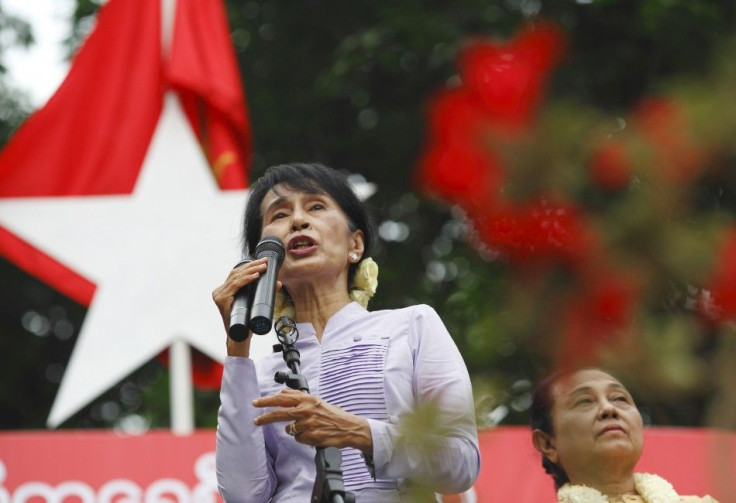Myanmar By-elections: Aung San Suu Kyi Expected To Win Historic Elections

Thousands of voters in Myanmar cast their votes in a historic ballot Sunday by which the country's democratic icon Aung San Suu Kyi is set to enter the parliament for the first time.
The Nobel laureate and her party National League for Democracy (NLD) were contesting the elections for the first time after a quarter century-long pro-democracy struggle which saw her spending most of time either in jail or under house arrest.
The by-elections would fill just 45 vacant seats in the 664-member parliament and the election results would not alter the power equations in the parliament. However, the elections attracted international attention as it was the first election which Suu Kyi was participating after her release and she is expected to win the elections.
The last general election in 2010 was boycotted by Suu Kyi and party accusing it of rigged in favor of military-backed ruling party.
The Sunday's by-elections are also deemed important for both the country and the world as Suu Kyi's entry to parliament is expected to act as catalyst for development for the poverty-ridden but resource rich country, which had closed its doors to the outside world till recently.
The process of change gathered momentum in this South East Asian country after the military junta, which ruled more than two decades, handed over the power to the current ruling party after a general election, which is widely believed were corrupt and rigged.
There weren't many expectations from the government which consisted of retired government officers when they had assumed office last year. However, they surprised the world by ushering in a sea of pro-democratic change, phase by phase to the country.
They opened up the country for international visitors and even have invited international observers to monitor the current elections.
Now, Suu Kyi's entry to the parliament is deemed as another step towards restoring the democracy and bringing back the international relations to normalcy. The election results are expected to encourage the West to lift the sanctions placed on the country over the military regime's anti-democratic attitude in the past.
The US and European Union hinted that they would end the sanctions if the Sunday's elections are free and fair.
This in effect will open up the economy of the country for the Western world that is eagerly waiting to explore the trade and business opportunities in the mineral rich country.
The election is also equally consequential to Suu Kyi, as this would end the political stalemate she is in. At the same time, she is also in the danger of accepting the legitimacy of the elections as well as the government, which she accused was not free or fair according to the democratic standards.
Nevertheless, she or the NLD is not in a position to continue to stay outside the political mainframe anymore. Any such move might be counterproductive and derail the democratic process which has been initiated in the country. The people in the country who are tired of the hermetic state of affairs are also looking forward to the change and Suu Kyi cannot afford to disappoint them.
It is not clear when the election results will be announced.
© Copyright IBTimes 2024. All rights reserved.












